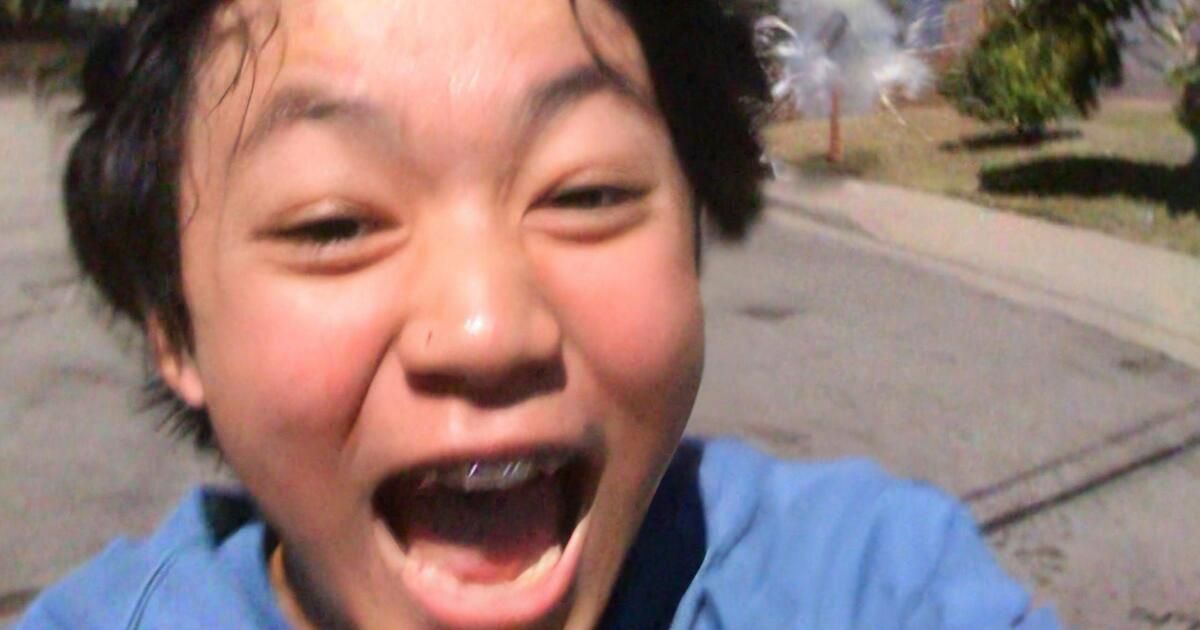One of the most mournful choruses of the Y2K era was sung by Blink-182’s Mark Hoppus: “Well, I guess this is growing up.” The band’s hit song “Dammit” was released in 1997 and predates by a decade the setting of Sean Wang’s 2008 Fremont, California-set narrative feature debut “Dìdi.” But a poignant pop-punk sentiment looms over this coming-of-age piece.
Our protagonist, Chris (Izaac Wang), finds himself in a difficult transitional moment: the summer before his freshman year of high school. His identity is in flux, teetering on ever-shifting terrains of personal insecurity, fickle friendships, and family pressure, and his unstable sense of self is represented in the film by his various names and nicknames.
At home, his mother, Chungsing (Joan Chen), and grandmother, Nai Nai (Chang Li Hua), affectionately call him “Dìdi” (meaning “younger brother” in Mandarin). His high school peers call him “Wang Wang,” one of a few ridiculous nicknames used by his lifelong friends, who strut and pose in ways that don’t befit his age. But he’s also starting to feel like maybe he just wants to be “Chris,” which is how he introduces himself to a group of slightly older skater boys when he’s looking for a hookup, adrift in a Northern California summer.
In this loosely autobiographical account, writer-director Wang focuses on this specific, fleeting moment in life, just a couple of months long, and puts it under his cinematic microscope, examining all the awkward agonies and brief ecstasies of this age. Wang previously explored his Taiwanese-American family background for last year’s Oscar-nominated documentary short “Nai Nai & Wài Pó,” about his grandmothers, one of whom appears in “Dìdi” as Chris’s grandmother.
In addition to cultural and geographic particularities, Wang also delves into the distinctive visual and sonic environment in which the story unfolds. Coming from a melting pot of East and Southeast Asian American families, Chris and his friends have emerged in a digital landscape that flourishes with MySpace Top 8 hits, power-pop band swag, and AOL Instant Message chimes. The film opens with a shaky, grainy YouTube video of Chris and his friends blowing up a mailbox, his cheerful, childlike face captured in freeze-frame as he flees.
Wang uses this mixed-media approach to present Chris’s life, lived both online and offline, and the juxtapositions in form reflect what’s happening to Chris inside, too. The low-resolution DV camera footage of Chris’s pranks and skateboard tricks that he posts online contrasts with the warm, intimate close-ups of the film’s cinematography elsewhere (by Sam A. Davies). Chris’s real-life social interactions are awkward and uninformed, unlike his online chats, which are bolstered by furious Google and Facebook searches, and scouring personal pages for clues. Much of his life is mediated by computer screens, so in person he stumbles.
But it’s not just social media that shapes his world. Race and culture fundamentally shape his reality, too, and Wang allows that theme to emerge organically and indelibly, allowing the audience to witness Chris navigate his own Asian-American identity. Things aren’t as rocky among his Korean and Pakistani friends, but with the black and white skaters and their group, he resents the moniker “Asian Chris,” the only moniker he attempts to edit out — an attempt that ultimately fails.
Much of “Dìdi” is about the halting, unintentional mistakes Chris makes in his clumsy attempts to connect: blocking instant messages from his crush, Madi (Mahaela Park), instead of telling her how he feels; deleting a bunch of videos he’s taken of his new skater friends simply because one was imperfect; blowing up at a classmate during a PSAT tutoring session. But Izaac Wang’s portrayal of this tortured teenage soul (so young, still in braces) is a sensitive expression of Chris’s insecurity around others and anxiety about how they’ll perceive him. Wang’s performance is mirrored by Chen’s as his mother, a stay-at-home mom with an artist’s heart. She delicately balances toughness and vulnerability to deliver a heartbreaking performance.
Sean Wang’s commitment to realism means that some of the stories don’t feel completely finished, as life stories often do. Chris makes mistakes, he falls apart, he tries his best to fix things, and they don’t always end well. He keeps going, trying to figure out who he is, what he wants, and to feel secure enough to savor those brief, happy moments of connection and freedom. Friends come and go, but family remains. We watch his journey to that simple but profound conclusion, and, well, I guess that’s growing up.
Katie Walsh is a film critic for the Tribune News Service.
'I did'
In English and Mandarin, with subtitles.
Classification: R, for the language used throughout the film, the sexual material and the use of drugs and alcohol, all of which involve teenagers.
Execution time: 1 hour, 34 minutes
Playing: In limited release on Friday, July 26












